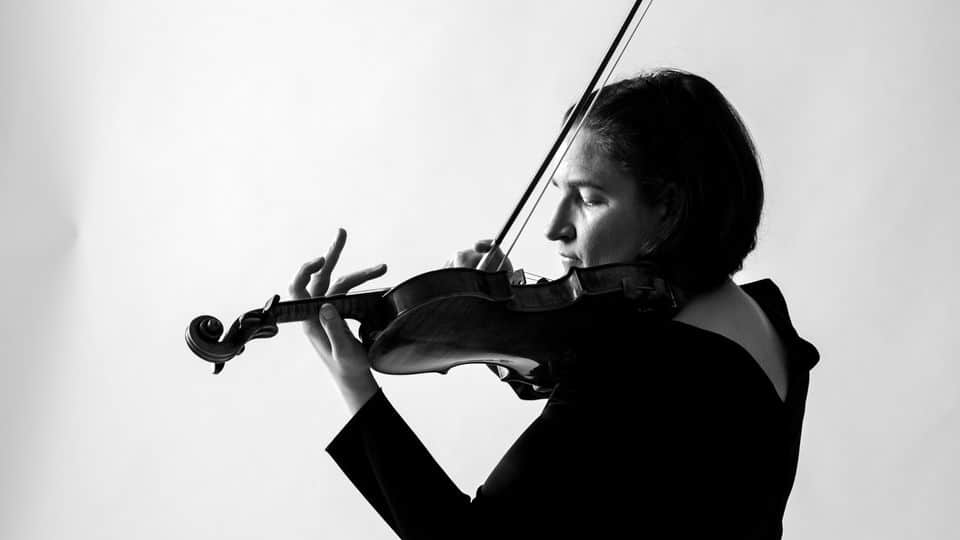Sacrilege? St Peter’s Basilica instals electronic organ
mainThe Vatican has bought a digital organ from a Pennsylvania company and will use it on all Papal celebrations in St Peter’s Square, replacing the traditional pipe organ.
The Allen Organ Company announces: ‘The Vatican’s new three-manual Allen GeniSys organ and its audio system include special adaptations to enable the instrument to be moved throughout the Vatican and other locations. While in St. Peter’s Basilica, the organ’s speaker cabinets are located behind the Choir with its sound also being amplified through the Basilica’s PA system to allow the organ to be heard by as many of 12,000 attending Mass.
‘During the first week of December, Allen President Steven Markowitz and Vice President Barry Holben traveled to the Vatican to install the organ and introduce it to Juan ParadellSolé, organist of the Pope, and Monsignor Massimo Palombella, Maestro of the Sistine Chapel Choir. In addition, the Allen organ was tested and approved for use in St. Peter’s Basilica.’
The digital organ was first heard in the Vatican on December 31.
No-one has yet noticed the difference.






why don’t they also get robot priests?
https://www.google.de/amp/s/amp.theguardian.com/technology/2017/may/30/robot-priest-blessu-2-germany-reformation-exhibition
They already have them!!
well, they might want an update …
I could hardly believe my eyes….
“We wanted people to consider if it is possible to be blessed by a machine, or if a human being is needed,” Stephan Krebs of the Protestant church in Hesse and Nassau, which is behind the initiative, told the Guardian.
‘Krebs’ is German for either lobster, or cancer. In this case, it obviously signifies a sort of cancer of the mind.
An entirely failed attempt at ‘modernizing’ religion. If there is a dirge of priests, they should analyse the reason for it and if necessary, initiate another reformation – but not into the direction of inane futurism.
But entirely expected from the feckless Pope Francis!
Given that the robot priest is a Protestant innovation, I’m not sure what it has to do with Pope Francis. But certainly the Holy Father has proven to be more style than substance.
I just remembered there even is Robot God! 🙂
https://theinfosphere.org/Robot_God
(sorry, I just can’t be serious about this …)
Like this? https://www.youtube.com/watch?v=z0NgUhEs1R4
Used for services in St. Peter’s Square. That’s outdoors – doesn’t using an electronic instrument there simply make sense?
It probably does. But it’s actually for use in the square and in the basilica. While I like the idea of an electric instrument for use in the square I find the idea of an electric instrument in St Peter’s a bit odd. If huge pipe organs can be constructed for, e.g., Liverpool Anglican cathedral, the Duomo of Milan, the Basilica of Our Lady of Sorrows, Queen of Poland, and the Episcopalian Cathedral of St John the Divine, surely something suitable could be built for St Peter’s.
They could have chosen a better brand and quality of digital organ….like Rodgers. Kinda surprised they didn’t just put a Casio keyboard out there.
Haven´t you heard Allen? It seem to be the best of all digital instruments.
Do a blindfold test. Or do a scientific sound wave comparison for pipe sound simulation. Bet on Allen.
Question: was the pipe organ amplified for St Peter’s Square? If so, the PA speakers would probably have had an impact on the quality of the pipe organ sound so I’m not surprised that no-one has noticed any difference.
IMO, the overriding requirement for power and durability means that there is a huge gulf between the quality that PA speakers can deliver and the quality obtainable from lower power HiFi speakers such as electrostatics, or the best studio monitoring speakers.
I’ve never heard a symphony orchestra amplified convincingly, or even close.
Horrified!!!!!!
St Peter’s basilica is so hughe that one can understand the problem to get organ sound reaching every corner. But that means you just need a big pipe organ. Hughe cathedrals possess big-sized pipe organs which can be heard everywhere in the building. But in Italy there is not so much a tradition of hughe organs, as which you will find in central & northern Europe. However, there is nowhere any sufficient space in St Peter’s because all corners are filled with ornaments and sculpture. They could have built a pipe organ in parts which could be put in whatever space there is, and play it through an electronic keyboard, enveloping the space in sound. But an electronic organ as such sounds like a miserable choice by culturally ignorant people.
“No one has yet noticed the difference.” The difference between this “toaster” and what, exactly? The sound of a pipe organ passed through a PA system? Of course, there would be little difference to notice, since upscale electronic organs now all use sounds sampled from pipe organs. That’s fine for the crowd outside in the square. But the use of this thing inside the basilica is a travesty.
Federico Fellini also had some ax to grind with the notion of travesty:
http://www.youtube.com/watch?v=QMQ4JicUs1A
First of all, the Vatican did not BUY this organ, they clearly have stated in writing that it was donated by the Allen Organ Company. Clearly this was a marketing decision to increase their presence and sales. Secondly, did you listen to the sound at about 14 minutes into the broadcast from Christmas Eve…. the sound is SO electronic and poor that no musician in their right mind could mistake it for a pipe organ.
While we’re on the subject, does anyone know why the Barbican Hall doesn’t have an organ? I once performed the Saint-Saëns Organ Symphony in there (I wasn’t the organist!) and it seemed an odd choice even at the time. Some kind of electronic instrument was installed for the occasion with huge speakers arranged at the very back of the stage. It wasn’t bad, though it must be said that despite the title of the piece it perhaps doesn’t make the greatest demands on the quality of the instrument. Financial arrangements presumably prevented use of the Royal Festival Hall, Royal Albert Hall, or Fairfield Hall. Does anyone else have experience with electronic instruments for orchestral concerts performed in venues without an orchestra?
Sorry, I meant without an organ!
At the Edinburgh Festival in the early 1980s, a performance of the Berlioz Te Deum in the Usher Hall used the organ of St Mary’s Cathedral played by Gillian Weir about a mile away. The organ was relayed via a bank of KEF Reference 105 speakers, probably the best HiFi/monitoring speaker available at the time. I wasn’t there but I understand that it was generally regarded as successful under the circumstances.
Years earlier, Ravi Shankar’s sitar was gently enhanced at the Queen Elizabeth Hall by a line of Quad electrostatics. Another first class HiFi speaker.
Note that PA speakers were not used on either occasion.
An interesting story! It sounds potentially worrying for all concerned in case something went wrong with the equipment that allowed communication between concert hall and organist…
Yes, it sounds risky.
I seem to recall that there was a problem with the Usher Hall organ so the electronic solution was preferable.
I can’t vouch for that though.
Carnegie Hall has an electronic organ. Pretty awful, even in pieces like Enigma Variations and Pines of Rome let along a piece with a “solo” organ part or exposed solos (Alpine Symphony, Taras Bulba, Manfred Symphony). Avery Fisher also has an electronic organ. Boston has a very good pipe organ as does Verizon Hall in Philadelphia and the difference is immense. Nobody has ever been able (or maybe even attempted) to raise money for a real organ at Carnegie…………..
Can someone explain to me why it’s a “sacrilege”, “travesty”, “horrific”, etc., *if* it is indeed the case that no-one can tell the difference? Why?
As for why there’s no organ in the Barbican Hall, I’m also interested in that question, if anyone has an answer.
But there IS an organ in the Barbican Hall, one of a very special kind, which is only visible and audible for people with the most refined musical sensibilities.
There was certainly a tender submitted by the UK firm of Grant,Degens and Bradbeer to a design made in consultation, I believe, with Simon Preston. A three manual neo-classical specification roughly the same size as Fairfield’s Hall in Croydon. Nothing ever came of it, I suspect it was never provided for in the original architectural designs, unlike the RFH. A mystery.
Well, when it comes to digital organs, Allen is one of the better brands. I know a couple of colleagues with Allen instruments and they seem very happy about them. And with those performance requirements it seems to be the most practical solution. Not at all the best, but what can you do…
As long as THIS is not realised ín Saint Peter’s basilica in Rome, what’s the problem???
http://hydraule.org/bureau/biblio/cavaille/proj_rom/projet.htm
just finished watching/listening to Christmas Eve Mass and first thing noticed was the tone of the organ – definitely not a pipe organ – what a shame.
just watched/heard Christmas Eve Mass and immediately noticed that it was not a pipe organ – what a shame to replace that wonderful sound with the empty sound of an Allen electric organ.
No pipe organ was ever used in St. Peter’s Square. What a ridiculous comment!